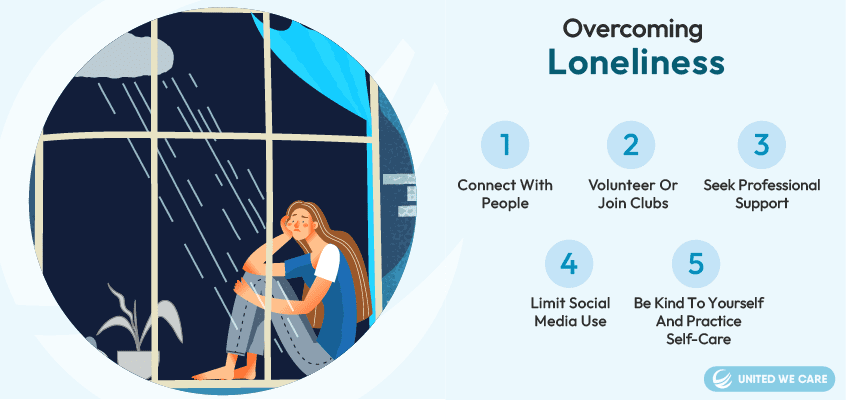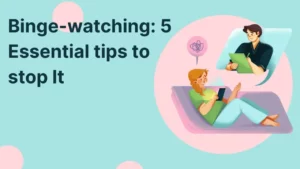Introduction
All my life, I had many people around me. I take pride in knowing that not just my family and friends but even my teachers kept in touch over the years. However, there came a time in my life when, even though I had so many people around me, I felt lonely. In these digital times also, where we are more connected than ever before, we can feel lonely.
Loneliness is a state of mind that disturbs us when we feel disconnected from those around us. This feeling of loneliness does not see age, race, or gender. It impacts nearly 61% of people globally.
You may feel that lonely people don’t have social connections, but the reality is that loneliness can arise from physical distance, emotional detachment, or a lack of meaningful conversations. Along with emotional issues, it can impact physical as well as mental health. Empathy and compassion can be the answer to loneliness as they provide a sense of belongingness and inclusion.
“The most terrible poverty is loneliness, and the feeling of being unloved.” -Mother Teresa [1]
I Am Feeling Lonely-Reasons for Loneliness
Loneliness is like creating a wall around you. While being surrounded by people, you can still feel lonely. Although there is no single reason for loneliness, many factors can contribute to it [2]:

- Living Away From Loved Ones: We might have to live in different cities or countries for higher studies or work. This relocation, work commitment, and other life changes can lead to lesser interactions with the people we love, resulting in feelings of loneliness.
- Losing Relationships: A sense of loneliness can emerge after the death of a loved one or the end of a signification relationship, be it a friend or your partner. These situations can make you feel abandoned and push you toward emotional isolation.
- Lacking Social Skills: If you have a fear of talking to people or don’t know how to start and maintain conversations, you are more susceptible to feeling lonely. A lack of social skills can cause people to misunderstand and outcast you from a gathering. Furthermore, they may question your race, gender, ethnicity, and sexual orientation.
- Living in a Virtual World: You might have heard people say they have “online friends.” From Orkut to Omegle, many online chat platforms are available for us to make friends. But we also need to understand that since we don’t know those people well enough, they can add to the sense of superficiality and disconnection, further increasing loneliness.
- Physical and Mental Health Issues: Health conditions can severely affect our emotional well-being. Chronic physical diseases like cancer and heart conditions can make us irritable and add to feelings of loneliness. Furthermore, conditions such as depression, anxiety, or social phobia can create barriers to relationships, contributing to a cycle of loneliness.
- Financial Condition: Money can’t buy happiness, but a lack of money can lead to loneliness. Not having enough money can make you feel embarrassed, and you may not be able to socialize with people since you probably won’t be able to spend money.
Symptoms and Impact of Loneliness
Symptoms and the impact of loneliness go hand-in-hand. It is also possible that either the symptoms lead to loneliness or loneliness leads to these symptoms [3] [4]:
- Emotional Discomfort and Social Withdrawal: Whether you’re around people or not, you may still feel sad, empty, and uncomfortable. These feelings can make you feel disconnected, as if there is no contentment or joy in your life. You may also feel the need to avoid social gatherings.
- Anxiety and Depression: Anxiety, depression, and loneliness are interrelated. If you have faced anxiety and depression for a long time, loneliness can be a side effect. On the other hand, if you have had a sense of loneliness for a long time, anxiety and depression might increase.
- Low Self-Esteem: When we feel low on confidence and self-worth, we don’t like talking to anyone. A feeling of loneliness can make us think negatively about ourselves and lower our sense of value in social situations.
- Disturbed Sleep: Loneliness can disrupt sleep patterns. If you have difficulty falling asleep, staying asleep, or experiencing restful sleep, loneliness has probably started setting in.
- Substance Abuse: Most people use substances to fill some kind of void or emptiness in their lives. It becomes their coping mechanism to elevate the feeling of loneliness.
- Increased Irritability and Lethargy: Loneliness can suck all the energy out of you, making you feel lethargic. Furthermore, you may feel irritated at the smallest of things, which can reduce your ability to cope with everyday triggers.
- Focus and Concentration Issues: If you are unable to focus and concentrate, face memory issues, and have a lower ability to understand things, it is possible to have feelings of loneliness.
Read more – loneliness no more
Overcoming Loneliness
Loneliness is a feeling which means that you can allow yourself to feel differently. Just focus on the process, however long it might be [5] [6]:

- Connect with People: The comfort zone makes us feel secure, but it also adds to our feelings of loneliness. Get out of the house, meet new people and old friends and family. You may talk to them and get to know them better. Go for activities and events you like. That way, you can expand your social circle and find like-minded people.
- Volunteer or Join Clubs: Helping society and the environment as a volunteer is a great stress-buster. When you see a smile on someone’s face and they get comforted by your presence, you will feel less lonely. Moreover, if you pursue a hobby, you will feel more relaxed and rejuvenated. You never know; by volunteering, joining a club, and pursuing your hobby, you might find supportive people who fill your heart and help you overcome loneliness.
- Seek Professional Support: A mental health professional can help you understand the root cause of your loneliness. That way, you can address the issues, learn coping skills, and develop a healthy relationship with yourself. United We Care is a platform where you can find the right help.
- Limit Social Media Use: The world of social media is mostly fake, as people don’t really show their real selves on it. Although these platforms can be helpful, overuse of them can be harmful. Set a time limit for yourself to use social media platforms. 5 minutes of social media every hour is more than enough.
- Be Kind to Yourself and Practice Self-Care: You are not alone in feeling lonely. Just try being kind to yourself and avoid self-criticism and negative self-talk. To do so, you can indulge in self-care activities, like meditation, mindfulness, deep-breathing exercises, healthy eating, drinking enough water, and picking up hobbies you like.
Read more –Is social isolation the invisible enemy
Conclusion
Loneliness can happen to anyone at any age or stage of life. It can impact us mentally, emotionally, physically, and socially. Therefore, it is important to learn how to cope and overcome these feelings. Get out of your comfort zone, meet new people, pick up hobbies, and indulge in self-care. Essentially, just be kind to yourself. It is important to remember that overcoming can take time and effort, but with the help of empathetic and compassionate people around, the journey might become easy.
If you are feeling lonely and looking for professional help, you can reach out to our expert counselors or explore more content at United We Care! At United We Care, a team of wellness and mental health experts will guide you with the best methods for well-being.
References
[1]“The Most Terrible Poverty Is Loneliness and the Feeling of Being Unloved – Welcome to Rizing Starz,” Welcome to Rizing Starz, Dec. 07, 2017. https://www.rizingstarz.org/terrible-poverty-loneliness-feeling/
[2] C. Chai and A. Y. MD, “Loneliness: Causes, Coping With It, and Getting Help,” EverydayHealth.com, Jul. 29, 2022. https://www.everydayhealth.com/loneliness/
[3] M. R. Vann, MPH and J. L. MD, “9 Secret Signs of Loneliness,” EverydayHealth.com, Jan. 12, 2018. https://www.everydayhealth.com/depression-pictures/are-you-lonelier-than-you-realize.aspx
[4] “What Is Loneliness? Causes, Effects And Prevention,” Forbes Health, Aug. 02, 2022. https://www.forbes.com/health/mind/what-is-loneliness/
[5] “How to Deal With Loneliness: Ways to Stop Feeling Lonely | Cigna,” How to Deal With Loneliness: Ways to Stop Feeling Lonely | Cigna. https://www.cigna.com/knowledge-center/how-to-deal-with-loneliness
[6] M. Manson, “How to Overcome Loneliness,” Mark Manson, Oct. 08, 2020. https://markmanson.net/how-to-overcome-loneliness










